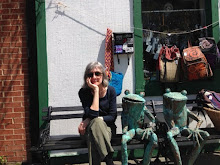Where is your brother?
I talked earlier about hearing this question as it relates to humanity globally, to people who are not literally our brothers and sisters.
And now let’s hear the question another way. Let’s hear Where is your brother? as Where is your brother? Let’s think about our real brothers and sisters, plus our parents, children, partners, close friends, and colleagues. Let’s call these people our “circle.” People who we actually know and experience in our daily lives, including people who have died. (So, for example, I still consider my parents to be in my circle, because I still feel myself to be in relationship with them.) Everybody think for a moment about who is in your circle.
Okay now a brief survey.
Raise your hand if you… ever expressed anger towards someone in your circle and you then regretted it.
Raise your hand if you… ever held a grudge about something said or done by someone in your circle.
Raise your hand if you or someone in your circle … lives with any type of brain illness or developmental disorder which makes life challenging for them and perhaps for you too – anything from autism, to bipolar, depression, or substance misuse, etc.? [remember: could be anyone in your circle]
Raise your hand if you or someone in your circle… has ever made a life decision that you thought was risky or harmful – such as abusing drugs or alcohol, or staying in an abusive relationship or job.
Raise your hand if there is any estrangement within your circle – if you or someone in your circle has ever been estranged from someone close to them?
One last question: Raise your hand if you… ever said or did anything hurtful to someone in your circle and you still regret it.
What’s the point of this little survey? Look at how much suffering we experience firsthand, and how much suffering we witness, just within our own little circles. And that’s not even including other challenges like aging, financial distress, disabilities, or trauma.
God’s question – Where is your brother? – clearly calls us to witness the suffering of the people in our own circle. God’s question challenges us to know where the people in our circle are – to know their struggles, their triumphs, their anxieties, their hopes. We are challenged to see and know and accept them just as they are. To love them, unconditionally. Mistakes and all. Misdeeds and all. This is our spiritual work – loosening the grip of ego and cultivating compassion – and doing that just within our own little circle is challenge enough for a lifetime.
And all the other suffering people in the world – are they not our brothers and sisters also?
This question brings me back to how I began, with that sense of dread I was feeling earlier this summer. Dread about the dark side of human nature. Dread which leads me to despair rather than hope.
Honestly, the dread is still there. I feel it in my kishkes – my guts. And I know that I am not alone; I can hear the dread in every post I read on Facebook, although among my friends and acquaintances it often comes out as sarcasm and righteous indignation.
Jewish tradition reminds us again and again that we have a choice in every moment. It’s in today’s Torah reading. God says to us: “Life and death I put before you, blessing and curse.” Let’s face it: to claim that everyone is our brother and sister is a choice. An expression of faith.
Most of what happens in this world is beyond our – or anyone’s – control. I find that becoming clearer to me the older I get. And we always have choices. When the question arises, Where is your brother? Where is your sister? we can choose to respond: I don’t know. Am I my brother’s keeper? And we would have some justification for doing so.
Or, when the questions arises, Where is your brother? we can choose to respond: I don’t know – but I’ll go find out.
I don’t know – but I’ll listen and learn.
I don’t know – but I’ll go lend a hand.
I don’t know – but I’ll show up.
Because ultimately we choose to be our brother’s keeper. We choose to be our sister’s keeper. Why? Because we have faith that cultivating a heart of compassion lifts us up beyond mere animal existence. Because we have faith that cultivating a heart of compassion ennobles our lives. Because we have faith that cultivating a heart of compassion connects us to our heritage, which proclaims – despite centuries of chaos and destruction – that every human being is a manifestation of the divine.
And so as we enter this new year – even as we may continue to feel some sense of dread – may we renew our resolve to do what we can for our brothers and sisters who are suffering, both within our circle and beyond. May we all be blessed to experience the heart-opening work of being our brothers’ and our sisters’ keeper. They need us now, more than ever. And we need them.
